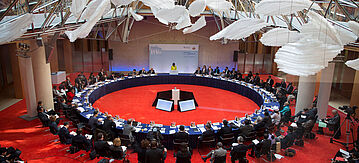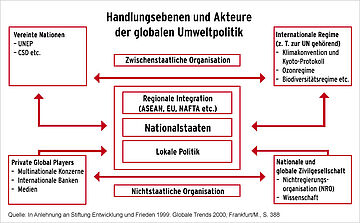What is international environmental policy about?

Anchor links
Environmental policy and globalisation
International environmental policy is particularly important in times of increasing globalisation, for many environmental problems extend beyond national borders and can only be solved through international cooperation. International environmental policy covers a number of issues: climate protection, sustainable energy policy, preservation of biological diversity and the conservation of forests, seas and soils. Further related topics are desertification, sustainable waste management and protection against hazardous substances. Nearly all these issues need overarching strategies to ensure that environmental protection is considered in other policy areas, such as cooperation with developing countries, as well.
Environmental protection under the United Nations
The United Nations founded its Environment Program UNEP (United Nations Environmental Program) as early as 1972. Since that time, the number of environmental agreements under the umbrella of the United Nations has risen steadily. The first one was the "Montreal Protocol on Substances that Deplete the Ozone Layer". The 1992 Earth Summit in Rio de Janeiro focused international relations on global environmental problems. Numerous conventions followed, such as the Framework Convention on Climate Change, the Convention on Biological Diversity, the Kyoto Protocol, the Convention on International Trade in Endangered Species, the Basel Convention on the Control of Transboundary Movements of Hazardous Waste and the Stockholm Convention on Persistent Organic Pollutants.
Environmental policy of the G8 / G20 countries
The G8 consists of Germany, Japan, Great Britain, United States of America, France, Italy, Canada and Russia. The G8 agenda has long included the environment. The aim is to send a high-level signal on current environmental issues such as climate protection, biodiversity, forest protection, combating environmental crime and the protection of the world's oceans. In 2007, under the German G8 Presidency, the foundation was laid for a long-term global climate protection target aiming to at least halve global greenhouse gas emissions by 2050. In the run-up to the climate conference in Copenhagen, in 2009 the G8 states acknowledged the need to limit global warming to 2 degree Celsius.
As a response to the global economic and financial crisis the G20 gained importance as a key player in the new "global governance". Alongside the G8 countries, the G20 member states are China, India, Brazil, Mexico, South Africa, Australia, South Korea, Indonesia, Argentina, Saudi Arabia, Turkey and the EU. The transition from the G8 format to the G20 format has thus been initiated. In Germany's view it would be useful for the G20 to deal intensively with issues outside the financial policy agenda - such as environmental and development policy. However, the G20 must first determine the role it has to play.
Objectives
Two of the main challenges of the 21st century are climate change and the loss of biodiversity.
- The Kyoto Protocol is the single most important instrument of international climate policy to date. This Protocol was the first legally binding international commitment by industrialised countries to reduce their emissions by at least 5 percent by 2012 compared to 1990. The German government feels that industrialised countries must aim to reduce their emissions by 80 to 95 percent by 2050, with the international community as a whole aiming to at least halve emissions.
- By 2010, the loss of biological diversity was to have been substantially reduced at global, regional and national level. This 2010 biodiversity target was adopted by heads of state and government at the World Summit on Sustainable Development in Johannesburg in 2002. The "3rd Global Biodiversity Outlook" report, a UN report of May 2010, concludes that the target has not been reached. Biological diversity is still declining dramatically. In the German government's view, the aim must be to slow or even reverse this trend.
Policy of the German government
Driving force for climate protection - providing momentum
The German government is a driving force behind the international climate protection process. For instance, after the failure of the climate conference in Copenhagen, the German government hosted the Petersberg Climate Dialogue in May 2010, thus restoring an atmosphere of constructive cooperation and trust to the international climate negotiations.
International Climate Initiative
With the International Climate Initiative, which was launched in 2008, the BMUB promotes climate protection projects in developing, newly industrialising and transition countries. The support measures include building a climate-friendly economy in the partner countries, developing measures for adaptation to climate change and the conservation and sustainable use of natural carbon sinks such as forests and wetlands.
Infographic : action levels and actors of global environmental policy

Das Organigramm zeigt wie und mit wem international Umweltpolitik gemacht wird. Regionale Akteure wie die EU, Nationalstaaten oder lokale Politik können Einfluss auf zwischenstaatlichen Organisationen (zum Beispiel die Vereinten Nationen) oder das Kyotoprotoll nehmen und umgekehrt. Aber auch nicht staatliche Organisationen wie Konzerne, Medien, Wissenschaft oder die Zivilgesellschaft können Einfluss auf die Akteure nehmen und sich so beteiligen. | The organigram shows how and with whom international environmental policy is made. Regional actors such as the EU, nation states or local politicians can influence intergovernmental organizations (for example the United Nations) or the Kyoto Protocol and vice versa. But also non-governmental organizations such as corporations, media, science or civil society can influence the actors and thus participate.
